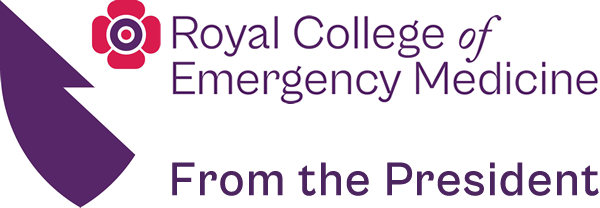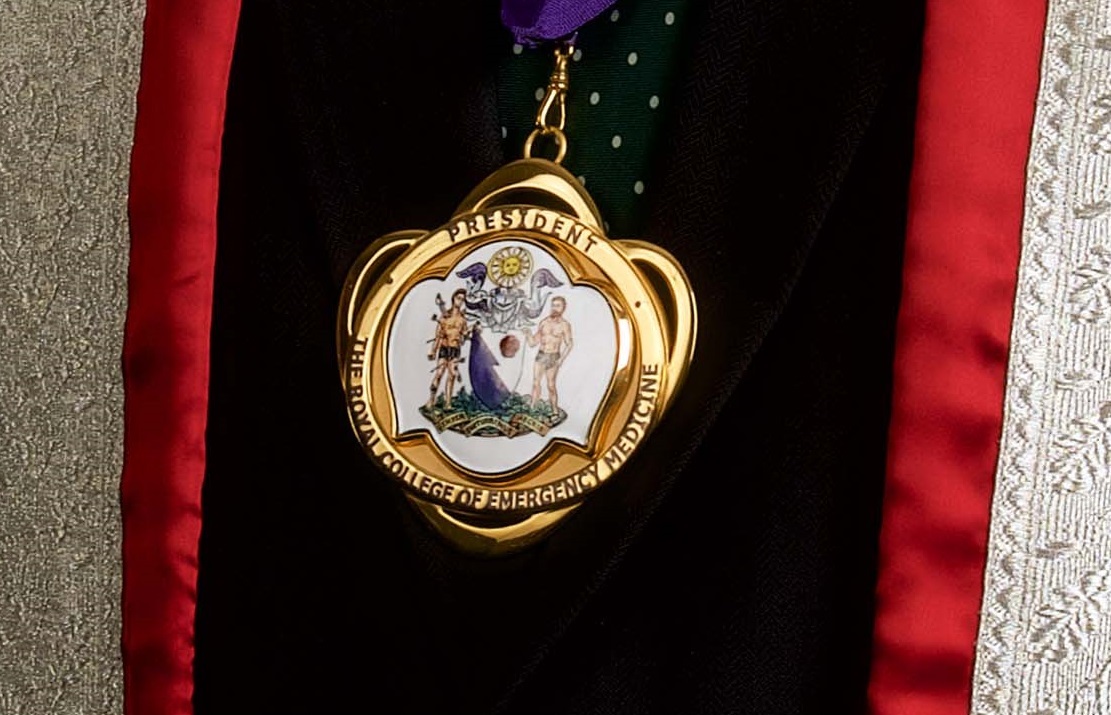The RCEM Presidential Election 2022 is now open for voting to all Fellows. We are pleased to have three excellent candidates – Dr Adrian Boyle, Dr Ian Higginson and Dr Martin McKechnie. Below each candidate sets out their manifesto and why you should vote for them.
Members eligible to vote can cast there vote using the unique codes they have been emailed at www.cesvotes.com/rcempresident2022. Voting closes at 12pm on 25 February 2022.
Adrian Boyle
I graduated from Southampton University in 1994 and after a few jobs on the south coast and with no clear career plan, I spent time in South Africa, working in a number of trauma units. I was instantly hooked by the immediacy of the work and the reward of saving life and limb with simple skills. I returned to the UK and created my own training program in South Yorkshire before becoming a Registrar in the East of England. I became interested in research, acquiring a Doctorate from Cambridge University before taking up a Consultant post in Cambridge in 2005. In my department, I have been Lead Educator and was Lead Clinician during the early pandemic. I also established a research delivery unit in my department. In the College, I established the Best Practice sub-committee and then chaired the Quality Committee for six years. I have been Vice President (Policy) since 2019.
As we begin to recover from the pandemic, our priorities have become clear. Too many members and fellows have told me of the intolerable conditions in which they are expected to work. The College needs to advocate hard on the value of multi-skilled professionals. The College needs to advocate for an environment where we can use, retain and refine our skills. The pressures of exit block and crowding mean that all too often we are doing other people’s work at the detriment of our own. The College needs to push back against emergency departments becoming the ‘system failure service’ and needs to advocate for other parts of the system to work well. Many of our departments are inadequately staffed and workforce needs to follow the workload. The development of the advanced clinical practitioner role has been a success which we must build on.
The College must continue to challenge the lack of parity in safety and resources allocated to urgent and emergency care. Though I work in a large teaching hospital, I really get that this problem is greatest in our smaller hospitals and this inequality is immoral.
The College needs to explain what we do. We still hear from all corners that there is a profound lack of understanding about what emergency medicine is. This matters because it often results in poor policy decisions , a lack of respect and conflict. The College needs to explain and guide professionals as to what it is we do. We also need to start a conversation with the public, whose knowledge of our working lives is more likely shaped by dramas and documentaries than reality.
As a specialty, we need to standardise much of what we do . The College must have a role in quickly disseminating best practice and useful innovations. We need to make it easier for bright trainees to experience other systems, both by coming to the UK and by working overseas. We need to embrace and facilitate non-traditional training pathways, so our teams have diverse skill sets.
It would be an honour to be your President.
Ian Higginson
My name is Ian Higginson. I am an EM Consultant in Plymouth and Vice President of RCEM.
The next President needs to ensure RCEM continues to develop as a modern, diverse, and responsive organisation so that we:
- Balance our core functions around training, exams, quality, CPD and acadaemia with policy work and advocacy.
- Ensure our culture reflects the values and aspirations of current and future members.
- Reflect our diversity as people, along with the different professional backgrounds and career pathways within our speciality.
- Listen to, and involve, our members and patients.
- Remain progressive, unconstrained by tradition.
- Spend your money and focus our efforts wisely.
COVID has proven the value of the acute care system and we are now at a critical juncture. The two main concerns for EM are still staffing and crowding.
Our brilliant multi-professional workforce is irreplaceable, and at risk. Our speciality should be one where we thrive rather than survive. We all need to see how we can have sustainable, full, and rewarding careers whatever the nature of our ED. This also means working out how to inspire, train and retain the next generation. We must be the voice for smaller as well as large EDs. I would ensure that we improve the focus and coordination of RCEM’s workforce activity, backed up by meaningful data from across the UK. We can then drive the agenda around planning, investment and change.
We must challenge the unacceptable normalisation of crowding, of substandard care and of risk concentrated in EDs. We also need to be positive: offering sensible ways forward as the experts in what works, and what doesn’t. RCEM must be proactive, leading the various discussions about our direction of travel and our standards of training and care. The alternative is having our specialty redrawn for us, often based on misconceptions or weaknesses elsewhere in the system. This will mean better defining the core work of EM within acute care. Our ethos is to look after those who need us when they are at their most vulnerable, but our skills could be focused on those we serve best. I would offer early clarity, strategic intent and direction to this, along with the bold, forthright advocacy required.
And me? I bring high-level leadership experience within the wider NHS as well as RCEM, combined with an academic background in clinical leadership, operational management, and quality. I can understand, define and tackle complex problems, whilst drawing people together to find ways forward. I have led some of RCEM’s most progressive efforts around funding, service design, quality, workforce and crowding. I have contributed directly to the effective running and modernising of College, improving the diversity of our membership, and responding to the lived experiences of our members and patients. There is more to do, and I would put all my energy into shaping our future whilst leading and representing us in the present. I believe I have the passion, drive and ideas to be your next President.
Martin McKechnie
I am Martin McKechnie, a substantive Consultant in Emergency Medicine in NHS Lothian in Scotland for 18 years.
I conduct my clinical duties at 2 NHS and University of Edinburgh-affiliated teaching hospitals:
St. John’s Hospital in Livingston, a medium-sized DGH which sees all acute adult and paediatric presentations with some surgical and orthopaedic ambulance bypass protocols in place, and:
the Royal Infirmary of Edinburgh which is a large tertiary adults-only Major Trauma Centre.
My varied clinical, managerial, political and media experiences allied to and incorporated within those selected leadership positions outlined below now allow me to advance my candidature for the role of President, and thus to represent our Emergency Medicine specialty and its wider community with credibility, integrity, strength and skill
- 8 years as an operational Emergency Department Lead during difficult complex prolonged regional acute services reconfiguration. This required sensitive negotiations with local and regional patient-representative groups and specialist surgical services in particular
- 7 years with RCEM as elected member, Vice Chair of the National Board for Scotland, and ultimately Chair and Vice President (Scotland) on Council and Executive, and the Academy in Scotland from 2014 – 17. This was a time of great reputational profile, political success, unprecedented investment and workforce expansion for RCEM Scotland
- Since demitting as VP, I have been seconded to NHS National Services Scotland (a special Health Board, generally regarded as the home of “wicked issues”!) for whom I am the National Clinical Lead for the new Scottish Trauma Network, fully delivered and operational in 2021 despite the pandemic.
These leadership positions all require considerable transferable engagement and productive relationship-building and influencing skills beyond the clinical arena. From Chief Executives to First Ministers and Health Ministers in Government, to Health Spokespersons representing all political parties, to Health Select Committees, to senior Civil Servants and policy-makers, to print, radio and television journalists.
I have the proven statesmanlike, ambassadorial and personable skills to represent RCEM with distinction at the highest levels.
I subsequently served RCEM as an invited member of the Corporate Governance Project Board. The combined strengths of the governance structures of both the Trustee Board and Council now place RCEM on a strong footing moving forward, particularly in our relations with the Charities Regulator.
All our constituent colleagues in Emergency Medicine have suffered gravely during the past 3 years of pandemic. Nevertheless we must position ourselves for future endemic conditions. This must be proactive. The lessons learned from the many mistakes made demand our strong leadership and clear messaging.
We have matured as a representative organisation with a strong voice.
We have the mandate to advocate to power.
This provides a significant opportunity for RCEM to dominate the centre ground of the future planning of emergency care. It is time to refocus and reinvigorate the message on our core issues and our extraordinary range of talents.
I invite you to watch my accompanying short video which will give you more insight into my style of leadership, articulation and personality.
Thank you.


